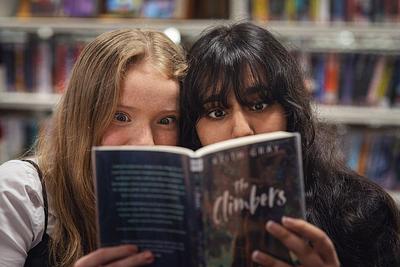Research shows that reading regularly can improve literacy and language skills (Jerim et al, 2019). For example, reading comprehension (understanding what we read), reading fluency (reading quickly and accurately) and decoding (breaking down unfamiliar words to help pronounce them) benefit from a regular reading practice.
Because it is important to have strong literacy skills by the end of secondary school, a lot of research into teenagers' reading has focussed on achievement outcomes like these. However, research shows that reading fiction books might have several other benefits for teens.
Reading fiction supports self-discovery and development
Reading fiction books might help teenagers develop their understanding of 'who they are'. Research has shown that connecting with fictional characters helps readers to explore their own identities. Our identities are made up of our personalities, experiences, values, goals, thoughts, and beliefs, and help us understand why we think, feel, and behave in certain ways. Research suggests that reading fiction might give us an opportunity to experiment with different identities in safe, imagined environments (Slater et al, 2014).
Some researchers think that when we emotionally connect with a character in a book and feel immersed in a story, our own identities temporarily expand to include the thoughts, feelings, and experiences of the characters we are connecting with.
In this way, fiction books provide an opportunity to explore different possibilities for ourselves, and to reflect upon the parts of our identities which are important to us. This process might be especially important in our teenage years, as we explore and develop or sense of who we are.
Reading fiction helps us understand, relate to, and empathise with others
Fiction books might also help teenagers to develop their understanding of other people and their ability to take others' perspectives. Perspective taking is a skill that develops throughout our teenage years as our social worlds become increasingly complex. Research indicates that connecting with fictional characters might help readers to strengthen their perspective taking skills.
When we get absorbed in a story, we put ourselves in the characters' shoes, taking their perspective as we imagine what they are thinking and feeling. One group of researchers experimented with Harry Potter books, finding that identifying with positive characters in the books, and being able to take their perspectives, reduced prejudice towards groups that are often discriminated against in real life (Vezzali et al, 2015). Research has also indicated that feeling transported into a narrative can influence empathy and other interpersonal skills (Bal et al, 2013).
Reading fiction supports our wellbeing
Connections with texts can also help readers navigate difficult emotions and understand their experiences. In the first 2020 coronavirus lockdown in particular, many young people reported that reading had made them feel better and encouraged them to think optimistically about the future.
More generally, the teenage years are often a period of great change. Teens have to navigate the transition to high school, changing relationships with their peers, increased extra-curricular commitments, and are generally becoming more aware of the social and political world around them. With all this in mind, it is no wonder that escaping into the pages of an imaginary world might help support teens' wellbeing. Teens say reading can help them feel comforted, relaxed, entertained, and gives them an opportunity to escape from their everyday lives.
Reading can have numerous benefits for teenagers. While we often focus on attainment outcomes, reading also helps teens develop their self-understanding and understanding of others, and can support their emotional wellbeing at a particularly tumultuous period of life. With the teen years being a particularly vulnerable time for reading habits, it's important we support teens to find and access books they enjoy to help them experience all these benefits.

